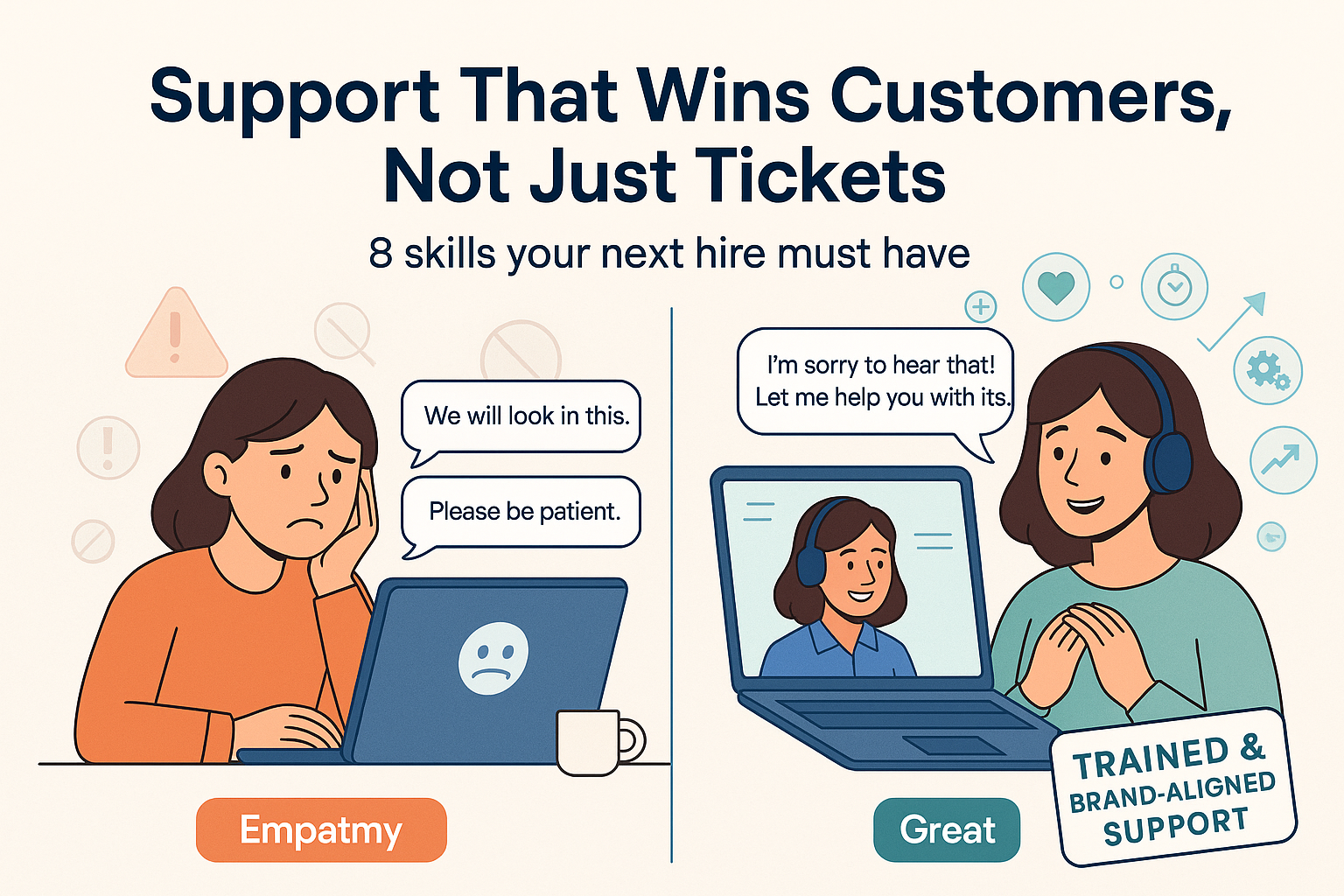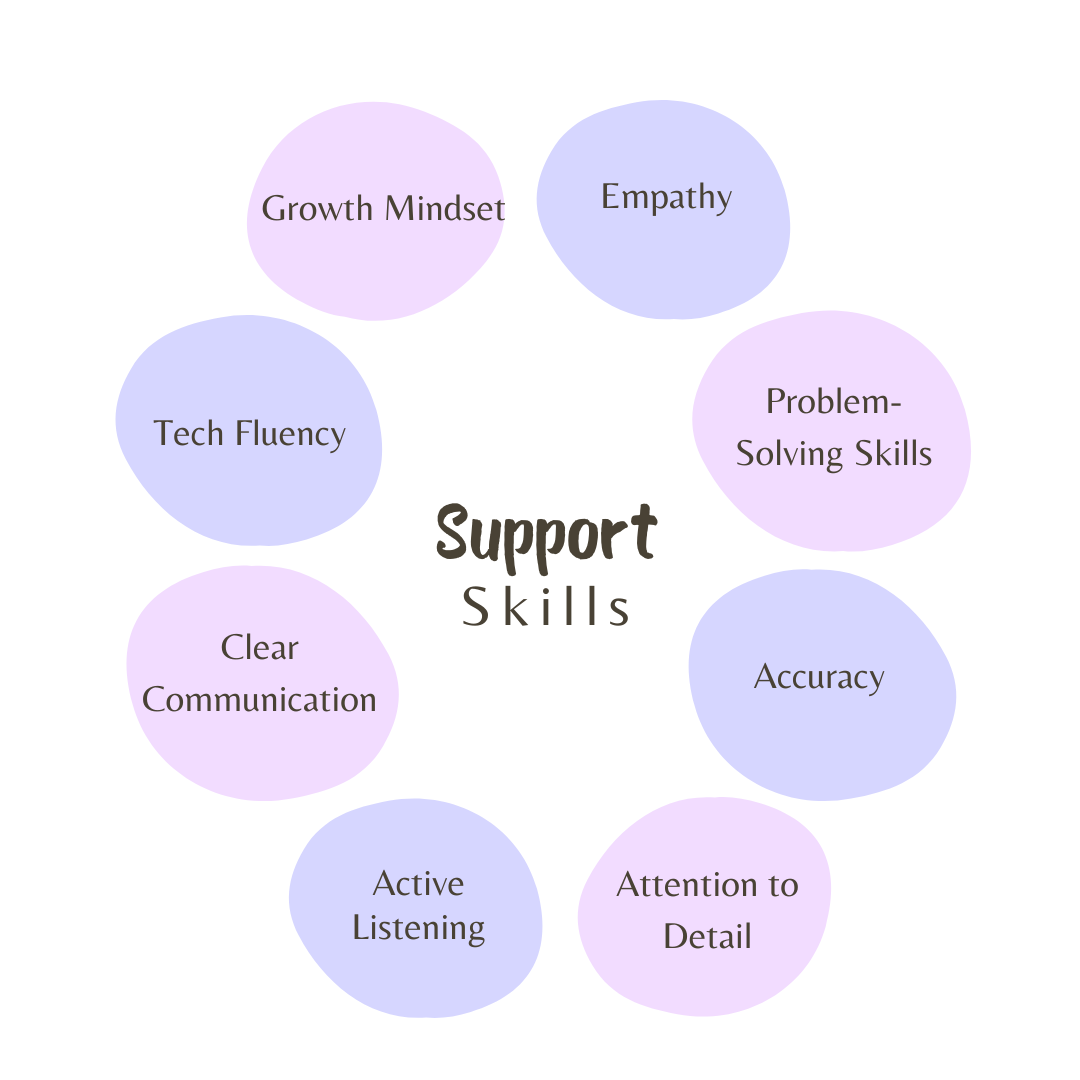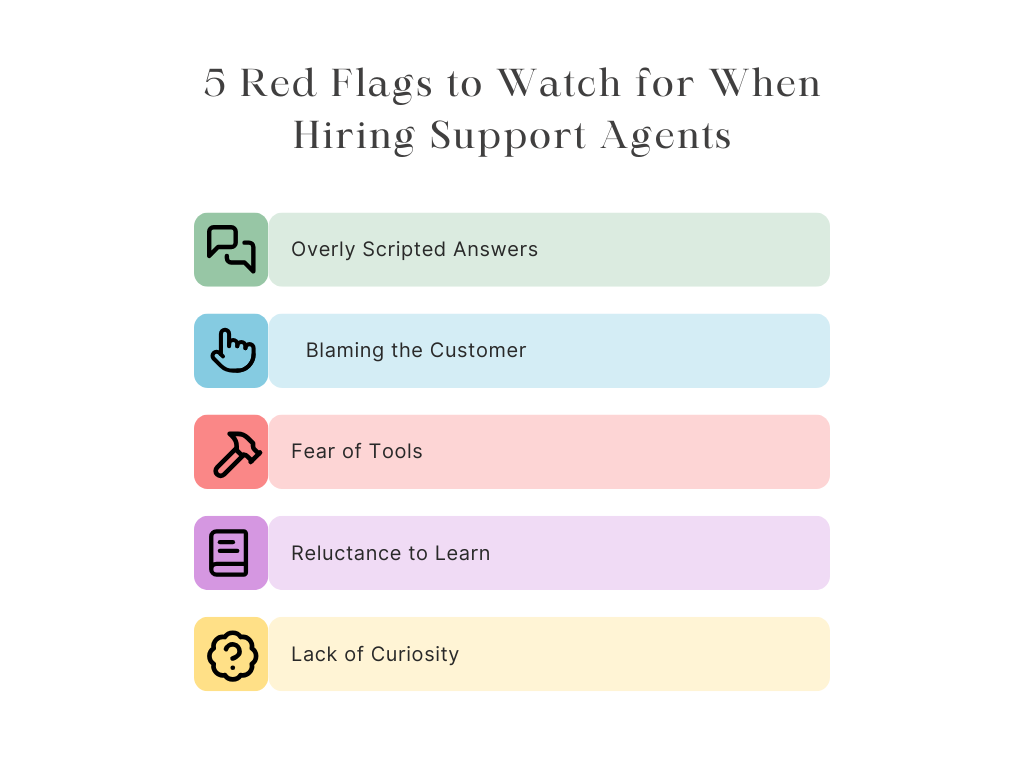Top 8 Customer Support Skills to Look for Before You Hire
Because polite isn’t enough anymore.
When a customer contacts your support team, they’re not just looking for answers, they’re judging your brand. One clumsy interaction, and you might lose a sale, or worse, a loyal customer.
That’s why hiring the right support agents isn’t just about experience. It’s about skills, real, proven skills that make customers feel seen, heard, and helped.

So, what should you really look for before you hire your next support rep? Here are 8 skills that go beyond the basics, and why they matter.
Table of Contents
- Why Hiring the Right Support Agent Matters
- Top 8 Customer Support Skills
- Bonus: Culture Fit & Brand Understanding
- Customer Support Skills Checklist
- Common Red Flags to Avoid
- Real-World Impact: A Quick Case Study
- Ready to Hire?
Why Hiring the Right Support Agent Matters
Customer support is no longer a reactive function, it’s a core part of the customer journey. In fact, according to Salesforce, 94% of consumers say a positive support experience makes them more likely to repurchase.
When you hire just to fill shifts, you end up with high churn, poor satisfaction scores (CSAT), and escalations that could’ve been prevented. But when you hire customer support agents with the right skills, they not only solve problems, they build brand love.
Top 8 Customer Support Skills

1. Empathy
Empathy is the ability to genuinely connect with what a customer is feeling. It’s what transforms a “we’ll get back to you” into “I understand how frustrating that must be, and I’ll do everything I can to help.”
What it looks like:
When a customer’s gift order gets delayed before a birthday, the agent doesn’t just process a refund. They apologize with care, offer a quick ship workaround, and include a gesture, like a coupon or handwritten note.
2. Problem-Solving Skills
Good support agents follow protocols. Great ones figure out creative, policy-aligned solutions to unexpected problems. Especially in remote roles where escalation isn’t always immediate, agents should be able to troubleshoot independently.
What it looks like:
An agent receives a vague complaint: “My order is wrong.” Instead of asking generic follow-ups, they quickly check order history, photos, and shipping logs, then propose a solution within minutes.
3. Speed with Accuracy
Customers expect quick responses, but not at the cost of accuracy. A fast but wrong answer leads to frustration and repeat contact.
What it looks like:
An agent resolves a shipping issue in under 5 minutes via chat while updating the tracking system and confirming refund eligibility, all without errors.
4. Attention to Detail
Every support ticket is a data point. Small mistakes, wrong names, missed attachments, incorrect replacements, can cost your brand money and trust.
What it looks like:
An agent remembers that the customer is in a different time zone and schedules a callback accordingly, without needing to be told.
5. Active Listening (and Reading)
Many customer issues aren’t clearly articulated. Skilled agents know how to read between the lines and ask clarifying questions.
What it looks like:
A customer writes: “I thought this came in black.” The agent doesn’t reply defensively, they check the listing, clarify the colour mix-up, and issue a smooth exchange.
6. Clear, Human Communication
Support isn’t just about solving problems, it’s about how those solutions are delivered. The tone should be polite, confident, and warm, not robotic or overly formal.
What it looks like:
Instead of saying “Per our policy, returns must be initiated within 7 days,” a great agent writes, “We totally get how this can be frustrating. While our return window is 7 days, I’ll check if we can make an exception this time.”
7. Tech Fluency
Your agents don’t need to code, but they should be quick with tools, ticketing systems, chat platforms, macros, order tracking tools, and internal CRMs.
What it looks like:
An agent switches from Zendesk to Slack to Shopify within a support flow, tagging a teammate and updating a customer, all without needing a walkthrough.
8. Growth Mindset
The support landscape changes quickly: AI, new tools, evolving product features, customer expectations. The best support agents are learners.
What it looks like:
They proactively adopt new tools like AI-generated responses or feedback tagging systems, and regularly review help docs to stay sharp.
Bonus: Culture Fit & Brand Understanding
Beyond core skills, your agents should reflect your brand’s values and voice. A high-end skincare brand and a Gen Z apparel store shouldn’t sound the same.
How to test this:
Ask candidates to respond to a mock customer in your brand tone. If you’re luxury, does their message sound premium? If you’re playful, does it feel natural?
Customer Support Skills Checklist
| Skill | Why It Matters |
|---|---|
| Empathy | Builds emotional connection and customer loyalty |
| Problem-Solving | Reduces escalations and boosts first-contact resolution |
| Speed + Accuracy | Keeps customer satisfaction high |
| Attention to Detail | Avoids costly and repetitive mistakes |
| Active Listening | Gets to the root of vague or emotional complaints |
| Human Communication | Strengthens brand voice and customer trust |
| Tech Fluency | Increases agent productivity and response speed |
| Growth Mindset | Future-proofs your support team |
Common Red Flags to Avoid
When hiring, it’s not just about what to look for, it’s what to watch out for:
- Overly scripted answers: May lack adaptability.
- Blaming the customer: Indicates low emotional intelligence.
- Fear of tools: Suggests longer onboarding and future resistance.
- Reluctance to learn: Won’t keep up with evolving support needs.
- Lack of curiosity: Poor fit for problem-solving or remote roles.

If any of these show up in early interviews, they’re worth pausing on.
Final Thoughts: Skills Are the Strategy
Hiring great support agents isn't just about filling roles—it's about future-proofing your brand. The best teams aren’t built by chance. They're built by consistently choosing people who:
- Care deeply about the customer
- Adapt quickly to tools and feedback
- Communicate like real humans, not scripts
Whether you’re scaling a team from 1 to 10 or outsourcing for the first time, remember: tools can help, but people make the difference. A thoughtful hire today can save you thousands in refunds, hours in escalations, and earn you loyal customers who feel heard, even when things go wrong.
Hired support before and still felt the gaps?
Try kim.cc for free, get a trained agent who fits your brand, in just 48 hours.
No lock-ins. No setup. Just real support, done right - Start your free trial
